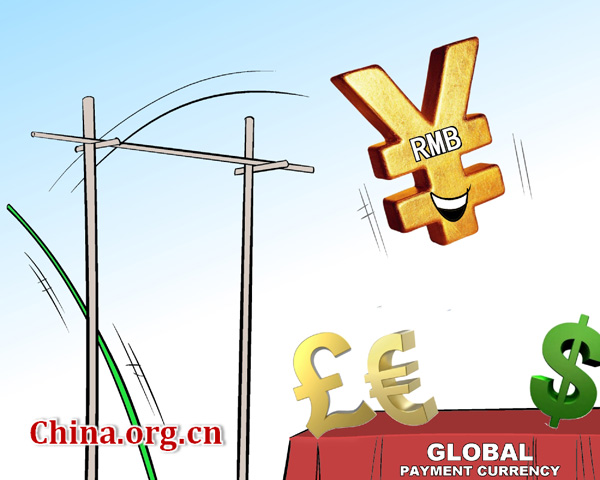RMB inclusion into the SDR basket benefits China and IMF
- By Zhang Jingwei
 0 Comment(s)
0 Comment(s) Print
Print E-mail China.org.cn, November 28, 2015
E-mail China.org.cn, November 28, 2015
|
|
|
Vaulting into the global ranks [By Jiao Haiyang/China.org.cn] |
Recently, Christine Lagarde, chief of the International Monetary Fund (IMF), said in a statement that the Chinese yuan, or the renminbi (RMB), has met the requirements of a "freely usable" currency.
Ms Lagarde reiterated her support for the IMF's recommendation to include the RMB into the Special Drawing Right (SDR) basket as its fifth currency following the U.S. dollar, British pound, the Euro, and the Japanese yen.
So far, the IMF's recommendation has been the most definitive voice given by the organization. It signals a foregone conclusion that the RMB will be included into the SDR basket.
When conditions are ripe, success is assured
Five years ago, China made its first move towards the RMB's inclusion into the SDR basket. However, it was voted down for the reason that the RMB "was not freely convertible" - a hard index which has instead accelerated the internationalization of RMB in the past few years.
It is worth mentioning that the move towards the RMB's inclusion into the SDR basket is only an external cause which becomes operative through many internal causes in the internationalization of the RMB.
Since the 18th CPC National Congress in November 2012, China has strengthened the reforms on the exchange rate market and the interest rate market, which are not only the need of the financial system reform at home, but also the need of the internationalization of the RMB.
The promotion of the "Belt and Road Initiative" and the operation of the Asian Infrastructure Investment Bank (AIIB) as well as the establishment of four free trade pilot zones at home [namely in Guangdong, Tianjin, Fujian and Shanghai] mean that the internationalization of the RMB has become the core theme and most urgent task of China's reform policies.
In August of this year, the People's Bank of China (PBC), China's central bank, allowed its currency to trade in a range around the middle rate. On October 24, the PBC lowered the benchmark interest rates of RMB loans and deposits of financial institutions. Moreover, the PBC also decided not to set up floating ceilings on commercial banks and rural cooperative financial institutions any longer. At this point, the marketization of the RMB's interest rates had basically been completed.
Deeply docking with overseas markets to realize the globalization of China's financial system has a direct bearing not only on the country's "Belt and Road Initiative," but also on its social and economic governance. RMB's internationalization is the goal, while its inclusion into the SDR basket is the international community's recognition of RMB.
It will be a win-win result for China and IMF
For the IMF, the SDR basket needs the RMB, too. At present, there are four international currencies in its basket - the U.S. dollar, British pound, the Euro and Japanese yen - representing the highest level of global financial governance.
China is the largest goods trading country and the second largest economy with foreign exchange reserves ranking first in the world. The inclusion of the RMB into the SDR currency basket is conducive to enhancing the representation and appeal of the SDR. As President Xi Jinping said, it will help improve the international monetary system and uphold global financial stability. So, having interests in common in this matter, China and the IMF fit in easily with each other.
The IMF knows clearly that only reform can bring about sustainable development. In 2010, the IMF created a reform program to improve the discourse right of the emerging markets including China. However, this reform program was blocked by the U.S. Congress. The example of the AIIB shows that, once an old order won't recognize China's power, a new order will start all over again.
The IMF is very sensible, too. It has a very good grasp of the rhythm of its reform to help it keep pace with the times. In August, the IMF still had doubts about "the free convertibility of the RMB." However, three months later the IMF announced that all the previously pending operational issues (free convertibility) had been solved by the Chinese government.
The IMF's high efficiency is the result of its cooperation and coordination with China. It is also the result of cautious support from the United States. It can be said that, the RMB's inclusion into the SDR basket, which will be discussed and voted on November 30, is already an event of big probability. By October of next year, the RMB will become one of the genuine global convertible currencies.
Statistics show the RMB's decisive influence
Currently, the Chinese yuan has exceeded the Japanese yen to become the world's fourth largest payment currency. If it is successfully included into the SDR basket, the RMB will account for roughly 14-16 percent of the SDR basket, standing behind the U.S. dollar (41.9 percent) and Euro (37.4 percent), and in front of the British pound (11.3 percent) and Japanese yen (9.4 percent).
The statistics mean a win-win result for the IMF and China. For the former, as a traditional global financial institution, it will still maintain global leadership because of its openness. As for the latter, the RMB will become a global currency, thus improving China's financial discourse in the global currency order.
The writer is a researcher of the Charhar Institute.
This article was translated by Li Jingrong based on the original unabridged version published in Chinese.
Opinion articles reflect the views of their authors, not necessarily those of China.org.cn.







Go to Forum >>0 Comment(s)